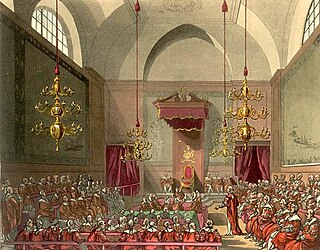
The House of Lords is the upper house of the Parliament of the United Kingdom. Like the lower house, the House of Commons, it meets in the Palace of Westminster in London, England. One of the oldest institutions in the world, its origins lie in the early 11th century and the emergence of bicameralism in the 13th century.

Margaret Ann Jay, Baroness Jay of Paddington,, is a British politician for the Labour Party and former BBC television producer and presenter.

Douglas Martin Hogg, 3rd Viscount Hailsham, Baron Hailsham of Kettlethorpe, is a British politician and barrister. A member of the Conservative Party, he served in John Major’s second government as Minister of Agriculture, Fisheries and Food from 1995 to 1997, and was a Member of Parliament (MP) from 1979 to 2010.

The House of Lords Act 1999 is an Act of the Parliament of the United Kingdom that reformed the House of Lords, one of the chambers of Parliament. The Act was given Royal Assent on 11 November 1999. For centuries, the House of Lords had included several hundred members who inherited their seats ; the Act removed such a right. However, as part of a compromise, the Act did permit ninety-two hereditary peers to remain in the House. Another ten were created life peers to enable them to remain in the House.

Robert Michael James Gascoyne-Cecil, 7th Marquess of Salisbury, Baron Gascoyne-Cecil, is a British Conservative politician. From 1979 to 1987 he represented South Dorset in the House of Commons, and in the 1990s he was Leader of the House of Lords under his courtesy title of Viscount Cranborne. Lord Salisbury lives in one of England's largest historic houses, the 17th-century Hatfield House in Hertfordshire, and currently serves as Chancellor of the University of Hertfordshire.
In the United Kingdom, life peers are appointed members of the peerage whose titles cannot be inherited, in contrast to hereditary peers. Life peers are appointed by the monarch on the advice of the prime minister. With the exception of the Dukedom of Edinburgh awarded for life to Prince Edward in 2023, all life peerages conferred since 2009 have been created under the Life Peerages Act 1958 with the rank of baron and entitle their holders to sit and vote in the House of Lords, presuming they meet qualifications such as age and citizenship. The legitimate children of a life peer appointed under the Life Peerages Act 1958 are entitled to style themselves with the prefix "The Honourable", although they cannot inherit the peerage itself. Prior to 2009, life peers of baronial rank could also be so created under the Appellate Jurisdiction Act 1876 for senior judges.

The Life Peerages Act 1958 established the modern standards for the creation of life peers by the Sovereign of the United Kingdom.

The Lords Temporal are secular members of the House of Lords, the upper house of the British Parliament. These can be either life peers or hereditary peers, although the hereditary right to sit in the House of Lords was abolished for all but ninety-two peers during the 1999 reform of the House of Lords. The term is used to differentiate these members from the Lords Spiritual, who sit in the House as a consequence of being bishops in the Church of England.
The House of Lords Appointments Commission (HOLAC) is an independent advisory non-departmental public body in the United Kingdom with oversight of some aspects of the Peerage of the United Kingdom. It has two roles:

The reform of the House of Lords, the upper house of the Parliament of the United Kingdom, has been a topic of discussion in UK politics for more than a century. Multiple governments have attempted reform, beginning with the introduction of the Parliament Act 1911 by the incumbent Liberal Government, which stated:
...whereas it is intended to substitute for the House of Lords as it at present exists a Second Chamber constituted on a popular instead of hereditary basis, but such substitution cannot be immediately brought into operation

The Cash-for-Honours scandal was a political scandal in the United Kingdom in 2006 and 2007 concerning the connection between political donations and the award of life peerages. A loophole in electoral law in the United Kingdom means that although anyone donating even small sums of money to a political party has to declare this as a matter of public record, those loaning money at commercial rates of interest did not have to make a public declaration.

Oliver Michael Robert Eden, 8th Baron Henley, 6th Baron Northington PC, is a British hereditary peer and politician, who is a Conservative member of the House of Lords. He has served in a number of ministerial positions in the governments of Margaret Thatcher, John Major, David Cameron and Theresa May, most recently as Parliamentary Under-Secretary of State at the Department for Business, Energy and Industrial Strategy.

Tony Blair's term as the prime minister of the United Kingdom began on 2 May 1997 when he accepted an invitation of Queen Elizabeth II to form a government, succeeding John Major of the Conservative Party, and ended on 27 June 2007 upon his resignation. While serving as prime minister, Blair also served as the first lord of the treasury, minister for the civil service and leader of the Labour Party. He and Gordon Brown both extensively used the New Labour branding while in office, which was presented as the brand of a newly reformed party that had altered Clause IV and endorsed market economics. Blair is the second longest serving prime minister in modern history after Margaret Thatcher, and is the longest serving Labour politician to have held the office.

Andrew Adonis, Baron Adonis, is a British Labour Party politician and journalist who served in HM Government for five years in the Blair ministry and the Brown ministry. He served as Secretary of State for Transport from 2009 to 2010, and as Chairman of the National Infrastructure Commission from 2015 to 2017. He was Chair of the European Movement, from March 2021 until December 2022 having previously served as Vice-Chairman from 2019 to 2021. He is currently a columnist for The New European.
The Prime Minister's Resignation Honours in the United Kingdom are honours granted at the behest of an outgoing prime minister following their resignation. In such a list, a prime minister may ask the monarch to bestow peerages, or lesser honours, on any number of people of their choosing. In 1997, an additional 47 working peers were created at the behest of the three main parties.
In British politics, Brownism is the social democratic political ideology of the former Prime Minister and leader of the Labour Party Gordon Brown and those that follow him. Proponents of Brownism are referred to as Brownites.

Tony Blair was Leader of the Labour Party and Leader of the Opposition from his election as Leader on 21 July 1994 until he became Prime Minister on 2 May 1997. Blair became leader upon the death of John Smith. Under Blair, the Labour Party was rebranded as New Labour to distance itself from previous Labour politics and the traditional idea of socialism. Despite opposition from Labour's left-wing, he abolished Clause IV, the party's formal commitment to the nationalisation of the economy, weakened trade union influence in the party, and committed to the free market and the European Union.

The House of Lords Reform Bill 2012 was a proposed Act of Parliament of the United Kingdom introduced to the House of Commons in June 2012 by Nick Clegg. Among other reforms, the bill would have made the House of Lords a mostly elected body. It was abandoned by the British Government in August 2012 and formally withdrawn on 3 September 2012, following opposition from within the Conservative Party.

Malcolm Ian Offord, Baron Offord of Garvel, is a Scottish financier and Conservative Party politician in the House of Lords. He currently serves as Parliamentary Under-Secretary of State for Exports.

















